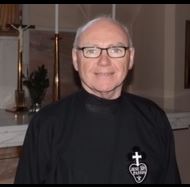This week we celebrated the feast of St. Mungo and it got me thinking about nicknames. The Gospel for the feast was the call of Simon in which Jesus confers on him the nickname Peter, which means rock, because Simon Peter will be the rock on which Christ will build his church. And while the choice of that Gospel probably has more to do with the waterside, with Simon’s call taking place by the sea of Galilee, bringing to mind Mungo’s ministry by the River Clyde, close the Molendinar Burn, still and all we know that Mungo was also a nickname, meaning the dear one, or the dear one of God, given to the young boy Kentigern by the monk Serf who helped take care of his mother, Thenew, whom we know better as Enoch, as in St. Enoch’s Square. The people who gathered around Mungo by the River Clyde were also given a nickname, the ‘Clasgu’, meaning the dear family (of God), and of course when the growth of people eventually became a city, the city was given the name ‘Glasgu’ (Glasgow) meaning the dear green place. I’m sure proper historians will have much to correct in that account, but I think I have at least the poetic gist of it.
I didn’t really have a nickname growing up, except that I was always referred to in the family as Wee Frank, but this was to distinguish me from my father, who was 6 foot, four inches tall, and therefore Big Frank; and, also, from my uncle Francie and my cousin Frankie. The only person who ever called me Francis was the Provincial of the Passionists at the time I entered; and there was another priest who could never remember my name, or any other student’s name for that matter, and he just called me Scotty, because at least he could remember what country I came from. When I was based in St. Mungo’s for my first three years after ordination, one of the Community used to make fun of how I tried to be so well prepared for anything I did, and he gave me the nickname Preparation F, after a certain ointment called Preparation H, which he apparently used quite regularly. I’m sure many of you will know what that particular ointment is used for, so it wasn’t the most flattering of nicknames.
Some of the saints had good nicknames. Saint Francis of Assisi for example was called God’s Troubadour because, on his itinerant preaching journeys, he was forever singing like a travelling minstrel to express his sheer joy at the beauty and the wonder of God’s creation, that he saw and delighted in every day. The Passionist, Saint Gabriel of Our Lady of Sorrows, who was also born in Assisi some 600 years after Francis, and who died the day before his 24th birthday, is one of the patron saints of young people; but he was once nicknamed The Dancer, because of the great social life he enjoyed before pursuing his vocation in Religious Life. One of the early Church Fathers, Saint John Chrysostom, the 4th century Archbishop of Constantinople, was nicknamed Goldenmouth because of the eloquence of his preaching and public speaking. There is also, of course, Saint Therese of Lisieux, the 19th century Carmelite mystic who, despite sickness, doubts and fears, strove to live each day with an unshakeable confidence in God’s love. Therese loved flowers and saw herself as the little flower of Jesus, who gave glory to God by just being her beautiful little self among all the other flowers in God's garden. Because of this she is forever known by the nickname The Little Flower.
In these days we are celebrating the Week of Prayer for Christian Unity, ending next Friday with the feast of the Conversion of St. Paul. In his earlier years, when he was called Saul, he was nicknamed Saul the Persecutor, because of his determination to destroy the fledgling Church of Christ. Later, after his conversion, and while on the Island of Cyprus, he begins to be called Paul, meaning Small, which some take to be a sign of growing humility, seeing himself as the least of all the Apostles. At the end he is nicknamed the Apostle to the Gentiles, striving to bring Christ’s Gospel to every tribe and tongue and people and nation.
That they may all be One, Father, as You are in Me, and I am in You; may they also be in Us.

 RSS Feed
RSS Feed
